It’s time for our monthly book chat! Today’s assortment is about as diverse as it gets: a graphic novel, YA romance, a book on finance, a mystery, a ghost story, and an essay collection. Let’s get to the reviews!
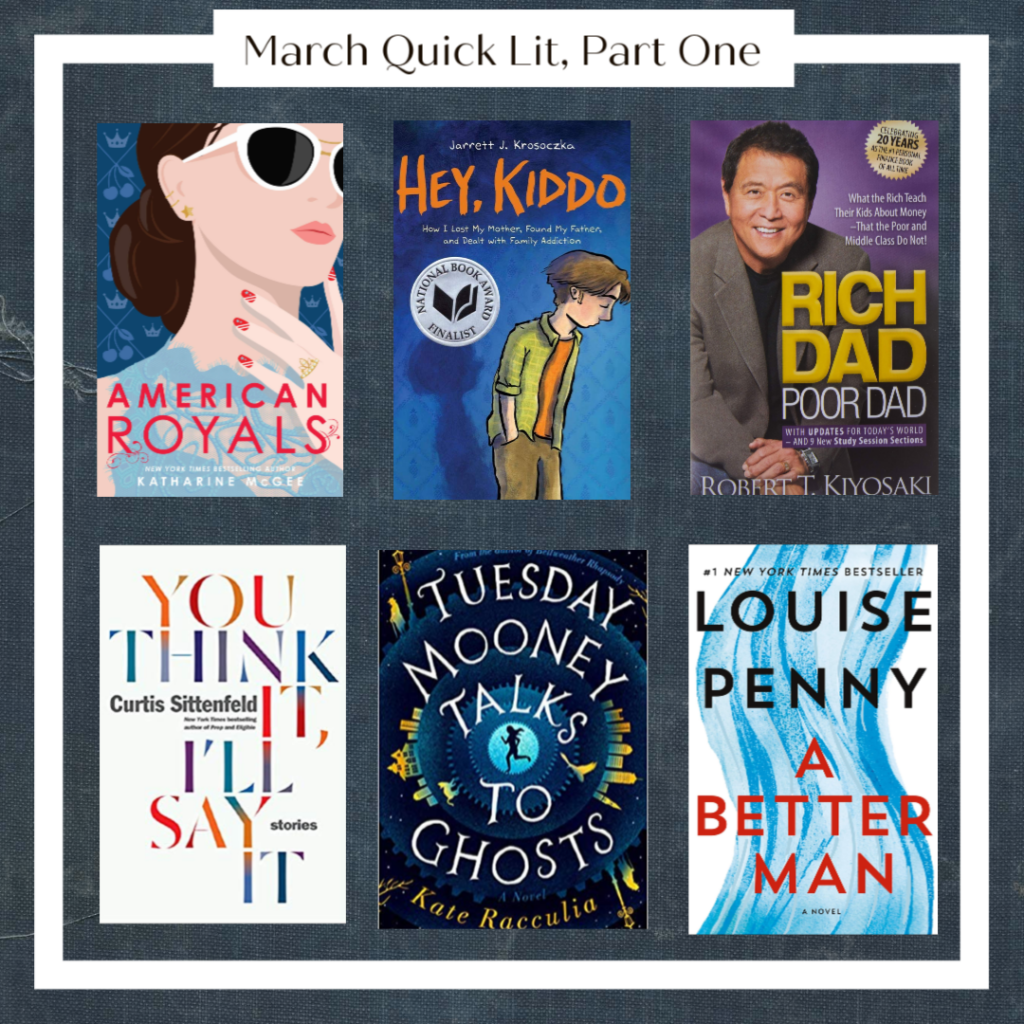
Rich Dad Poor Dad: What the Rich Teach Their Kids About Money That the Poor and Middle Class Do Not!, by Robert Kiyosaki: Luke read this classic finance book a few months ago and has been urging me to read it ever since. The book teaches financial principles through the lives and lessons of the author’s two fathers: his well-educated “poor” biological father and his best friend’s “rich” dad, a man with less formal education but greater business sense. Kiyosaki’s poor dad represents people perpetually scampering in the Rat Race, trapped in the cycle of needing to make more money to maintain their increasing lifestyle needs. In contrast, his rich dad represents the independently wealthy who have harnessed financial intelligence to make their money work for them so that they are not dependent on a job to support themselves.
According to Kiyosaki, all of our emotions around money are dominated by fear and greed. Consequently, we are risk-averse, which leads us to take the well-worn (but unsuccessful) path of pursuing a traditional education that will prepare us for an ordinary job—one that keeps us poor. After making a strong case for the importance of financial literacy, Kiyosaki spends a majority of the book explaining how to acquire assets (such as stocks, bonds, and real estate) that generate money and increase over time, rather than liabilities, which quickly depreciate. He explores the history of taxes and the power of corporations, discusses the importance of working for the sake of learning (which pays more in the long run) rather than working to earn a paycheck, and explains various forms of investment, including his preferred method, real estate investment.
I found the book to be a fairly engaging, straightforward read (even as someone with an admittedly low financial IQ) and several of the principles seem valid—particularly the importance of financial intelligence and the ability to differentiate between assets and liabilities. However, much of the book didn’t sit well with me. Many of these concepts SOUND good, but don’t necessarily hold up to scrutiny. Kiyosaki’s ideas are more theoretical than practical, and most of his (very vague) strategies are dependent on a willingness to take huge risks (something most of us are not willing or able to do).
After doing some further digging into Kiyosaki’s credentials and background, I was able to determine why the book didn’t resonate with me: it appears that the author is not at all who he says he is, and that much of the book is built upon lies. Apparently there is no evidence that rich dad or poor dad ever existed, nor is there proof that Kiyosaki obtained his wealth through the methods he promotes in the book. (Most of his money came from his involvements in MLMs and through sales of Rich Dad, Poor Dad AFTER it was published.) While I’m not opposed to an author using fable to introduce high-level concepts, I don’t appreciate Kiyosaki’s blatant dishonesty in neglecting to mention that these people and stories were products of his imagination. It’s difficult to trust the advice of someone posing as a financial guru whose primary money-making strategy is selling made-up stories.
Despite my reservations, I’m glad that Luke introduced me to this book, as it’s led to some helpful conversations about our own financial plans. It’s also raised my awareness of how woefully uneducated I am about financial matters, and I would like to read some more (valid) books about this topic in the future.
My Rating: 3 Stars.
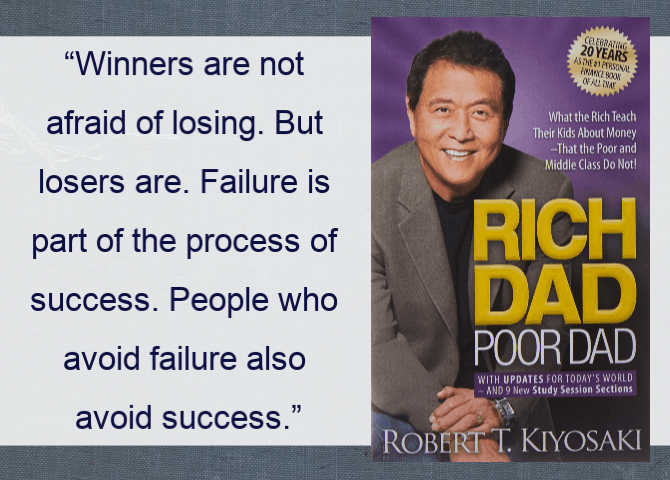
Hey Kiddo, by Jarret Krosoczka: In this graphic novel memoir, Jarret Krosoczka shares his story of growing up with his grandparents while not knowing his father and rarely seeing his mom, whom he eventually learned was in and out of rehab. Jarret’s grandparents are rough around the edges, but love Jarret and do their best to provide him with a nurturing home life. Still, Jarret struggles with identity and community as he makes his place in an environment marked by abandonment and addiction. Eventually, Jarret finds purpose and fulfillment in his artwork, which helps him make sense of his chaotic life as he attempts to make peace with his mom and track down his father.
This is a heartbreaking read filled with challenging themes. Sadly, I can imagine that many readers within the intended teen audience will resonate with much of Jarret’s story—if not the abandonment and addiction, certainly the feelings of loneliness and confusion. I appreciated the author’s candor in sharing his story, his ability to weave humor into the difficult moments, and the hope that he gleans amidst such hardship and pain. My favorite part of the book was the backstory that shares the early lives of Jarret’s grandparents and parents. I always enjoy learning about past generations and how they factor into someone’s present circumstances. I found Jarret’s affections and loyalty to his family so touching and was impressed with his ability to see good in them despite the ways his various family members let him down.
I’m still fairly new to the graphic novel format and felt it worked well for this memoir. While the abstract cartoons weren’t exactly to my taste, they softened the edges of a difficult story and made it more accessible to a wider audience.
My Rating: 3.5 Stars.
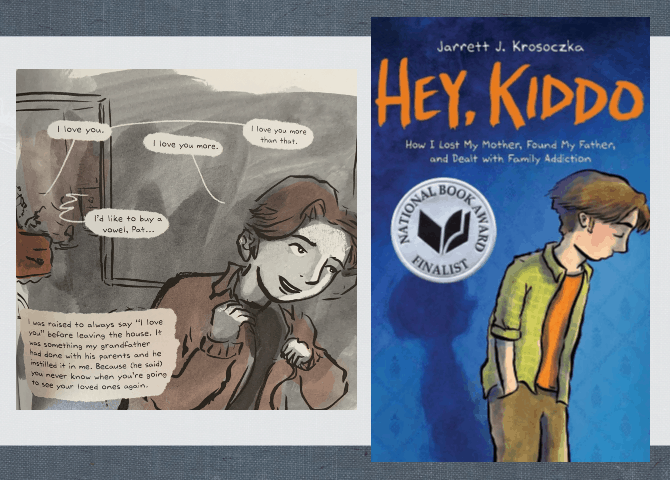
American Royals, by Katharine McGee: At the conclusion of the Revolutionary War, the American people invited George Washington to become the new nation’s king. Washington obviously declined the offer, but what if he hadn’t? American Royals takes place in an alternate reality in which Washington’s descendants still hold the throne, with Princess Beatriz in line to become the nation’s first Queen Regent. Meanwhile, her younger siblings—twins Jefferson and Samantha—are nothing more than public spectacles, free to enjoy their lives as wild 18-year-olds. When Beatriz is asked to begin the search for an appropriate husband, she and her siblings find themselves wrapped up in a trio of complicated love triangles. Will these young American royals be permitted to pursue true love, or will their national duties be forced to take priority?
I am fascinated by this book’s premise: What IF America had an established monarchy? How would our lives as American citizens be different today? Unfortunately, American Royals‘ answer to this question is that they wouldn’t be different at all. The book’s fictional world is an exact replica of our own, with the exception of the presence of royalty, which I found not only implausible but also a missed opportunity for the author. As for the story she did write, it’s fine: very melodramatic and superficial, as I’ve come to expect from YA. The characters are immature and hard to root for, and the themes of patriotism, honor, and young love are not explored to their full potential. It’s a light and fast-paced read, but doesn’t live up to the hype. The book ends on a very unsatisfying cliffhanger, but I don’t feel the need to continue with the series.
My Rating: 3 Stars.
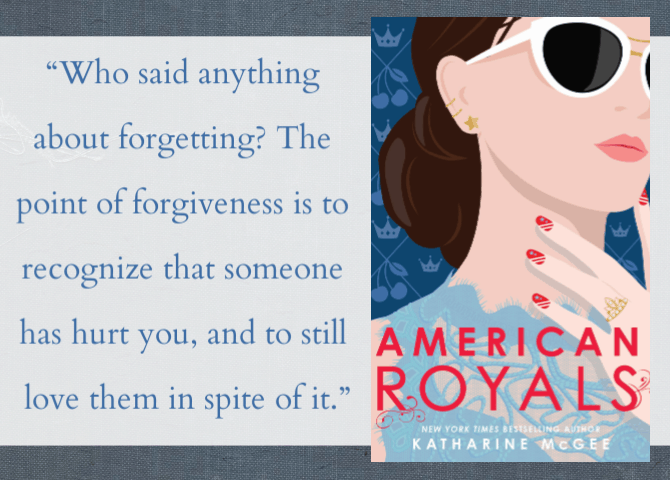
A Better Man, by Louise Penny: In this climactic fifteenth installment of the Three Lines series, Inspector Gamache returns to the Suerte de Quebec, where he now reports to his son-in-law (and former subordinate), Beauvoir. True to his character, Gamache is unfazed by his newly lowered status and puts his whole heart into his latest case, that of a pregnant young woman whose father comes to Gamache in the midst of a catastrophic flood, begging the inspector to help him find his missing daughter. The woman is instantly presumed dead, the victim of her abusive husband. But there is no proof that the husband is guilty, nor is there sufficient evidence to convict him. Prompted by his feelings as a father himself, Gamache is determined that justice be done while also upholding the law—a feat that appears impossible. Meanwhile, Gamache faces a social media onslaught against his character, and villagers in the town of Three Pines wage their own personal and professional battles.
Louise Penny has done it again, delivering a riveting mystery that combines a compelling plot with magnificent character development, brilliant sense of place, absorbing themes, and intriguing ethical discussions. With its numerous twists and red herrings, the primary story is one of my favorites of the series, and I liked that the background police force drama is present but doesn’t overwhelm the novel. The villagers of Three Pines have less page time in this book than in the past, but their appearances are, as always, delightful and contribute humor as well as emotional depth.
Don’t try to read this series out of order, but if you’ve read through book 14 and are waiting to begin A Better Man, you’re in for a treat!
My Rating: 4.5 Stars.
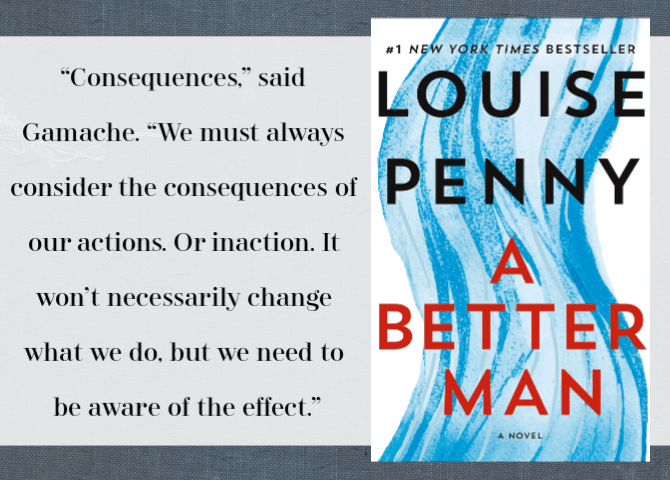
Tuesday Mooney Talks to Ghosts, by Kate Racculia: Tuesday Mooney is an offbeat loner who spends her time online in her job as a researcher, profiling potential donors for Boston Medical Hospital. While volunteering at a charity auction, Tuesday witnesses the sudden death of eccentric billionaire Vincent Pryce. Shortly after his death, Pryce’s family releases an obituary written by Pryce himself that instigates a city-wide treasure hunt with clues inspired by Edgar Allen Poe. Using her knack for research and her love of puzzles, Tuesday embarks on the hunt. She is joined by her flamboyant friend Dex, her adoring teen neighbor Dorry, and a mysterious young heir named Nathaniel Arches.
As Tuesday and her companions follow the clues, we get to know each unique character: Dorry is mourning her mother’s recent death while attempting to adjust to adolescence; Dex is working through various relationship issues; and Archie grows more cagey and unpredictable by the minute. Then there’s Tuesday, who has a secret of her own: for the past couple of decades, she has talked to ghosts, or rather, one ghost—that of her friend Abby, who died when they were teens, leaving Tuesday with an inability to trust herself or those around her.
While I enjoyed the scavenger hunt element and especially loved the literary ties, it was the characters who drew me to this book. They are unique and complex and it was intriguing to explore each of their motivations and actions through the lens of their pasts.
This is an unusual book, and not always easy to follow. The middle also drags a bit, but overall it’s a funny, adventure-filled, and engaging read.
My Rating: 4 Stars.
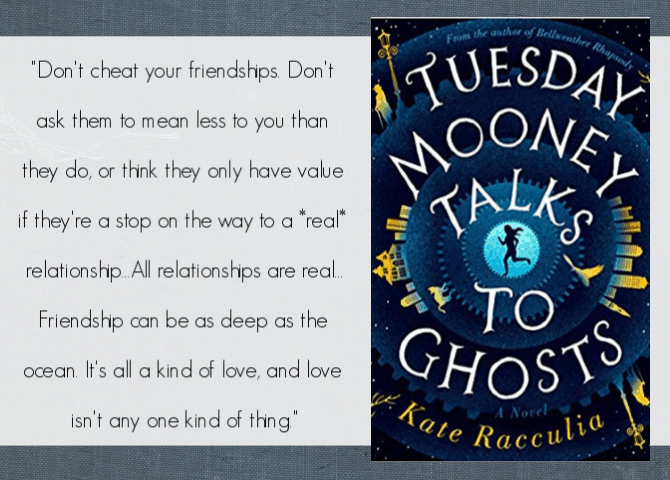
You Think It, I’ll Say It, by Curtis Sittenfeld: In this collection of short stories we peek in on ordinary scenes from the lives of a journalist who is offered the interview of a lifetime; a high-powered lawyer who encounters her high school nemesis while on her honeymoon; a newly-single college professor who falls into a relationship with her shuttle driver; and many more individuals as they walk through seemingly ordinary circumstances that can have long-term ramifications.
This is a very well done collection, with stories that sit nicely next to one another while also covering a range of experiences and subject matters. The stories are sharp, poignant, and insightful, and the well-drawn characters are memorable if entirely unlikeable. I was impressed with Sittenfeld’s ability to make poignant commentaries through such brief vignettes, and I found each story to be the perfect length: long enough to paint a picture or make a point, but not drawn out. The stories themselves are not particularly enjoyable, as they reflect the impolite and often cruel opinions and ideas many of us think but would NEVER say (to that end, the title of the collection is perfection), and many center around infidelity and deception; because of this harsh subject matter, it’s a collection that made me feel very disappointed in society (and, to be honest, in myself because I could see many of my own negative biases reflected within the stories).
While the particular vignettes are unique, there is a commonality in their themes: many explore long-held misperceptions and how they can wreck permanent damage on our psyches; quite a few involve characters who gain new insights on past experiences, relationships, and beliefs; and nearly every one unearths uncomfortable aspects of the characters and, consequently, of human nature. There is a strong liberal bent and critical eye towards conservative ideals, as well as quite a bit of feminist agenda-pushing which I might not have minded if it hadn’t been so blatant.
Sittenfeld is undeniably a brilliant writer, and this is a remarkable work, but far from a comfortable read.
My Rating: 3 Stars.
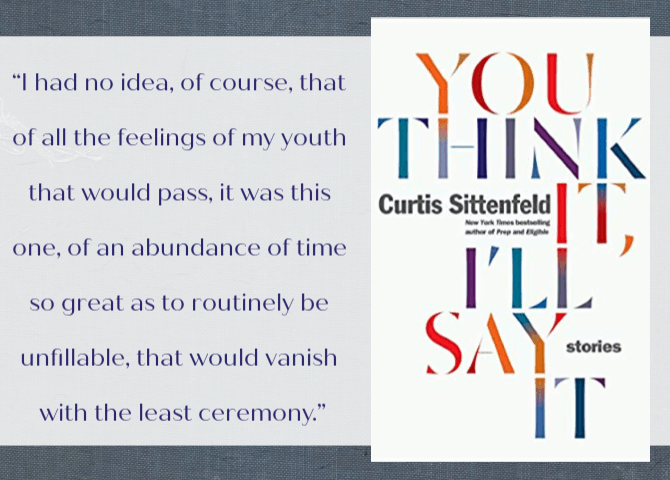
I’m linking up with Modern Mrs. Darcy to share what we’ve been reading lately. If you’re here from the link-up, thanks for stopping by! Check back here on Monday to read Part Two of this month’s Quick Lit, including reviews of one book I loved and two of the worst books I’ve read in years!
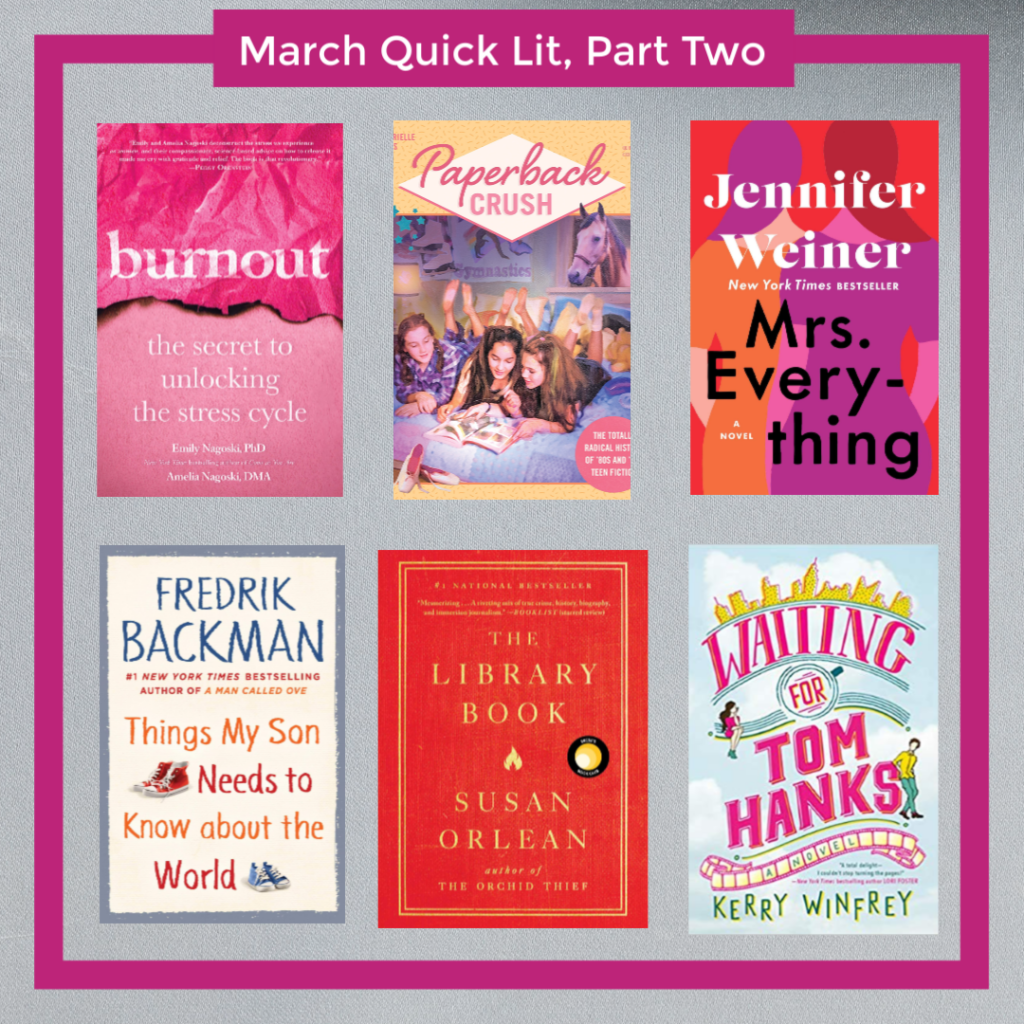
I didn’t know about the Frederik Backman book. It is going on my want to read list!
It’s a delight! Enjoy!